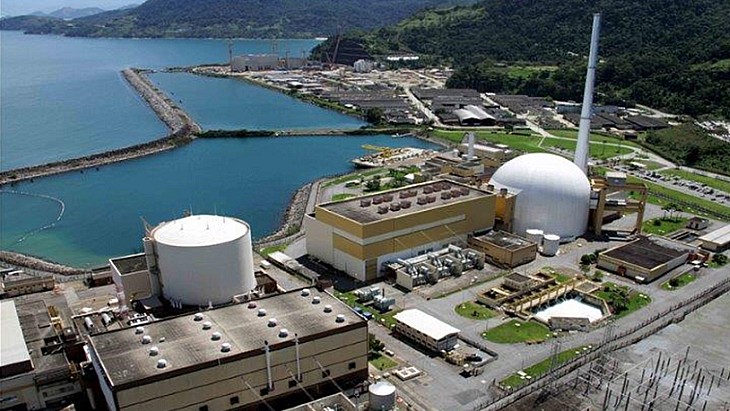Eletronuclear outlines clean hydrogen production plan
A project to produce 100 tonnes a year of clean hydrogen from the operation of the Angra nuclear power plant's two units was detailed at a seminar on sustainable hydrogen production in Brazil.

Brazil's Angra nuclear power plant has operated for more than 40 years (Image: Eletronuclear)
A study has been taking place into the feasibility of using hydrogen which is already generated at the plant by the seawater electrolysis process, with the proposal to capture and process the hydrogen "with minimal impact on the plant and its safety" while bringing forward environmental, economic and strategic benefits. Eletronuclear said the project could be implemented within two years.
Nelri Ferreira Leite, technical coordinator of the hydrogen project, explained that "Angra 1 and 2 use seawater in the tertiary circuit to cool the steam in the secondary circuit, after passing through the turbines that generate electrical energy. To prevent the proliferation of marine organisms in pipes and equipment, the biocide sodium hypochlorite is added to the refrigerant fluid in the tertiary circuit. As a result of the biocide production process through direct electrolysis of seawater, hydrogen is generated" without any contact with radioactive material found in the primary circuit of the plant. "The idea is to take advantage of the hydrogen already produced as a by-product by the company and which has never caused any impact on the marine environment in all these years."
Speaking at the seminar on the production of sustainable hydrogen in Brazil, he added that the plan was to demonstrate the application of clean hydrogen in Eletronuclear's administrative buildings and homes in Angra dos Reis and Paraty, as well as highlighting the hydrogen supply for the plant's electrical generators, with the possibility of supplying hydrogen-powered vehicles also an option.
The site had the advantage, he said, of the huge supply of sea water along Brazil's coast, avoiding the need for fresh water: "No other project in the world does this on an industrial scale. Furthermore, all of our technology for this process is entirely national." When Angra 3 is completed and starts operating the total annual production could increase to 167 tonnes.
Hydrogen is increasingly seen as a key component of future energy systems, if it can be made without carbon dioxide emissions. The idea is that it can be used to replace fossil fuels in transport, industrial and a range of other applications.
Researched and written by World Nuclear News
- China Institute of Atomic Energy
- Nuclear Power Institute of China
- Southwestern Institute of Physics
- China Nuclear Power Operation Technology Corporation, Ltd.
- China Nuclear Power Engineering Co., Ltd.
- China Institute for Radiation Protection
- Beijing Research Institute of Uranium Geology (BRIUG)
- China Institute of Nuclear Industry Strategy (CINIS)
- China Nuclear Mining Science and Technology Corporation


